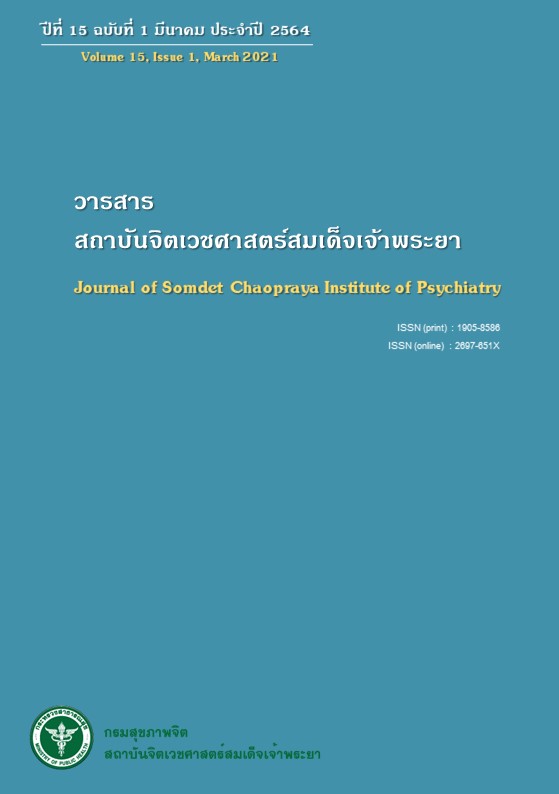การพัฒนาทักษะทางสังคมของเด็กออทิสติกโดยการใช้เกมกระดานร่วมกับการชี้แนะ
คำสำคัญ:
การชี้แนะ, เกมกระดาน, ทักษะทางสังคม, ออทิสติกบทคัดย่อ
วัตถุประสงค์ : เพื่อพัฒนาทักษะทางสังคมของเด็กออทิสติกโดยการใช้เกมกระดานร่วมกับการชี้แนะ
วัสดุและวิธีการ : การวิจัยครั้งเป็นการรายงานผู้ป่วยด้านการพัฒนาทักษะทางสังคม โดยใช้แบบแผนวิจัยการวิจัยปฏิบัติการในชั้นเรียน แบ่งเป็น 4 ขั้นตอน ได้แก่ ขั้นวางแผน ขั้นปฏิบัติ ขั้นสังเกตผล และขั้นการสะท้อนผล เครื่องมือที่ใช้ในการวิจัยครั้งนี้ประกอบด้วย 1) แบบบันทึกพฤติกรรมการแบ่งปัน 2) เกมกระดาน และ 3) แผนการจัด การเรียนรู้ทักษะทางสังคม โดยมีกลุ่มเป้าหมายคือเด็กออทิสติกช่วงอายุ 6 - 12 ปี จำนวน 3 คน วิเคราะห์ข้อมูลด้วยความถี่ ค่าเฉลี่ย และการวิเคราะห์ข้อมูลเชิงคุณภาพ
ผล : ทักษะทางสังคมของเด็กออทิสติกภายหลังได้รับการสอนด้วยเกมกระดานร่วมกับการชี้แนะเพิ่มขึ้น หลังดำเนินกิจกรรม ครั้งที่ 1 และ 2 การจัดกิจกรรมการเล่นเกมกระดานแบบกลุ่มส่งผลให้เด็กออทิสติกมีความสนุกสนาน มีทักษะทางสังคมที่ดีขึ้น เด็กออทิสติกที่เข้าร่วมเล่นเกมกระดานมีปฏิสัมพันธ์กับเพื่อนในกลุ่มที่ร่วมเล่นเกมกระดาน และการใช้การชี้แนะเข้ามามีส่วนร่วมในการสอนทักษะทางสังคม ทำให้การจัดกิจกรรมเป็นไปได้อย่างราบรื่น และมีประสิทธิภาพยิ่งขึ้น
สรุป : ทักษะทางสังคมของเด็กออทิสติกจากการประเมินด้วยแบบสังเกตทักษะทางสังคมภายหลังได้รับการสอนด้วยเกมกระดานร่วมกับการชี้แนะสูงขึ้นกว่าก่อนได้รับการสอนด้วยเกมกระดานร่วมกับการชี้แนะ
เอกสารอ้างอิง
Korsuwan K, Viriyangkul Y, A parent guide to autism: Teaching with love and understanding. 2nd ed. Chiang Mai: Leo Media Design; 2019.
Pimwong T, A Study on social skills of the behavioral problemed children in the mainstream and the normal peers in Prathom Suksa vs Through Cooperative Learning [Master’s thesis]. Bangkok: Srinakarinwirot University; 1998.
Tubbs J. Creative therapy for children with autism, ADD and asperger's using artistic creativity to reach, teach and touch our children. NY: Square One. 2008.
Hodkinson A. Key issues in special education needs & inclusion. 2nd ed. Liverpool: SAGE; 2016.
Coil DA, Ettinger CL, Eisen JA. Gut Check: The evolution of an educational board game. PLoS Biol 2017; 15(4): e2001984.
Gordon G. What is Play? in search of universal definition. In: Kuschner D (editor). From children to red hatters’ diverse image and issues of play. United State: University Press of America; 2009: 1-13.
Berereton A. Teaching young children with autism new skills [Brochure]. Melbourne: Monash University; 2011.
Luk JCM. Form of participation and semiotic mediation in board games for second language learning. Pedagogies: An International J 2013; 8(4): 352-68.
Oppenheim-Leaf ML, Leaf JB, Call NA. Teaching board games to two children with an autism spectrum disorder. J of Developmental Physical Disabilities 2013; 24(4): 347-58.
Hayes D. The use of prompting as an evidence-based strategy to support children with ASD in school setting in New Zealand. Kairaranga 2013; 14(2): 52-6.
Daraee M, Salehi K, Fakhr M. Comparison of social skills between students in ordinary and talented schools. J Edu and Edu Psy 2016; 7: 1-14
Sonnenschein S, Metzger S R, Dowling R, Gay B. Extending an effective classroom-based math board game intervention to preschoolers’ homes. J Appl Res Child 2016; 7(2): 1-30.
ดาวน์โหลด
เผยแพร่แล้ว
รูปแบบการอ้างอิง
ฉบับ
ประเภทบทความ
สัญญาอนุญาต
บทความที่ได้รับการตีพิมพ์เป็นลิขสิทธิ์ของวารสารสถาบันจิตเวชศาสตร์สมเด็จเจ้าพระยา



